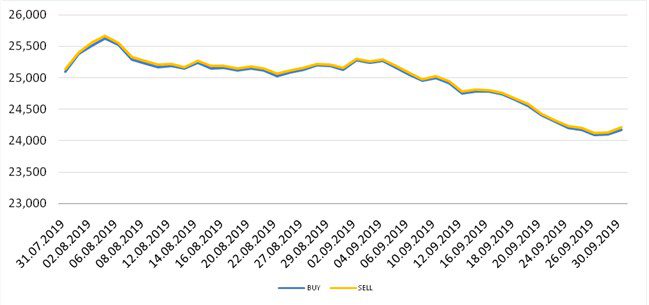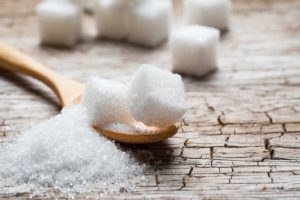
Deputy Minister of Economic Development, Trade and Agriculture – Trade Representative of Ukraine Taras Kachka and Director General of the World Intellectual Property Organization (WIPO) Francis Gurry discussed bilateral cooperation in the field of intellectual property and signed a Cooperation Program for 2020-2021.
According to a message on the ministry’s website, the parties also signed a memorandum of cooperation, which, in particular, provides for the establishment of a National Intellectual Property Center in Ukraine.
“We plan to create a National Center for Intellectual Property according to the methodology of the World Intellectual Property Organization, as well as to develop a network of Technology and Innovation Support Centers. In the future, Ukraine will join the WIPO-administered Marrakesh Treaty to Facilitate Access to Published Works,” the ministry quoted Taras Kachka as saying.
Changes in currency exchange, UAH/USD, 31.07.19.-30.09.19.


Kyiv Zhuliany International Airport served 2.009 million passengers in January-September 2019, which is 7.2% less than in January-September 2018.
According to statistics released by the airport’s press service, the number of passengers served on international flights for the nine months amounted to 1.959 million, on domestic flights some 50,200.
The number of flights in January-September 2019 amounted to 21,264 for arrival/departure, which is 8.3% less than in the same period in 2018, in particular 17,835 international flights and 3,429 domestic flights.
The most popular international destinations for the indicated period were Minsk (Belarus), Warsaw (Poland), Sharm el-Sheikh (Egypt), Rome (Italy), Vienna (Austria), Ankara (Turkey), Berlin (Germany), internal – Odesa, Zaporizhia, and Lviv.
In September 2019, the airport served 153,800 passengers, which is 50% less than in September 2018. The number of passengers served on international flights amounted to 151,400, on domestic flights some 2,400.
At the same time, the number of flights in September amounted to 1,601 for arrival/departure, which is 48.2% less than in the same period in 2018, including 1,344 international and 257 domestic.

DCH Group, a Ukrainian industrial and financial group of Oleksandr Yaroslavsky, is ready to invest in the reconstruction of Dnipro International Airport.
According to the press service of Dnipropetrovsk Regional State Administration, the project for the reconstruction of the airport was discussed by head of the regional administration Oleksandr Bondarenko and President of DCH Group Oleksandr Yaroslavsky during a meeting in Dnipro.
“A modern international airport is one of the main priorities of Dnipropetrovsk Regional State Administration. The reconstruction of the airport, which has long been morally and physically outdated, will give an impetus to the development of the entire region. These are new opportunities for business, medicine, tourism and the region’s economy as a whole,” Bondarenko said.
According to Yaroslavsky, DCH Group is ready to invest in Dnipro airport under public-private partnership.
He noted that the company already has experience in implementing a similar project in Kharkiv. There, the construction of the runway cost $200 million, the terminal some $107 million.
According to the president of the group, thanks to optimization and modern technologies, in Dnipro such work will be at least $100 million cheaper.
“I’ve repeatedly confirmed that I am ready to use our experience in the construction and development of Kharkiv International Airport in favor of the Dnipro community, the surrounding regions, the whole Ukraine. As soon as full funding for the construction of a runway is actually allocated and fixed in the 2020 national budget, DCH as a private investor will be able to begin work on the construction of the airport complex,” Yaroslavsky said.

Ukraine in the 2018/2019 marketing year (MY, September-August) exported 409,800 tonnes of sugar for $144.3 million, which is 27% less than in the previous MY, the Ukrtsukor National Association of Sugar Producers has reported
According to the association, during the reporting period there were changes in the geography of export deliveries.
“Although Uzbekistan remains the leader in imports, shipments to this country have significantly decreased from 210,000 to 96,000 tonnes. Azerbaijan ranked second with 74,000 tonnes, which ranked third last season (43,000 tonnes). Tajikistan ranks third with 36,000 tonnes (16,000 tonnes, the ninth place),” Ruslana Yanenko, the deputy chairman of the board of Ukrtsukor, said.
She noted that the share of deliveries to Uzbekistan in total exports decreased from 37% in the 2017/2018 MY to 24% in the 2018/2019 MY. The reasons for the reduction in shipments, in her opinion, are, first of all, changes in the tax policy of Uzbekistan, as well as a large number of logistic problems in the season related to the supply of Ukrainian sugar to Uzbekistan. In the 2018/2019 MY season, shipments to Israel and Libya increased, which ranked seventh and eighth in the overall ranking of Ukrainian sugar importers.
According to the association, sugar exports in the 2019/2020 MY will amount to approximately 300,000 tonnes.

Ukraine’s Verkhovna Rada has passed at first reading bill No. 1055-1 on lending state-owned and municipal property, envisaging the lending of this type of property via the e-auction system.
An Interfax-Ukraine correspondent has reported that the bill was backed by 263 MPs on Thursday.
“The Verkhovna Rada today adopted bill No. 1055-1, which will finally allow creating fair competition and fully opening up this market. Perhaps the story is familiar to many city dwellers: no one knows who and for what money, what “matchmakers” and “godfathers” rent premises in the middle of the city for UAH 1, to whom the high-rise complex of a plant is rented. All this is now a thing of the past,” First Deputy Minister of Economic Development, Trade and Agriculture Pavlo Kukhta said on his Facebook page, commenting on the adoption of the bill.
He said that according to the document, state-owned and municipal property should be leased according to the results of electronic auctions to those who offered the highest price.
In addition, a unified database of state-owned and municipal property leased will be created.
“By October 1, 2020, all existing lease contracts, even those that were concluded under the old law, will be entered to the electronic trading system @ProZorro.Sales with free access to data,” he added.